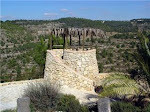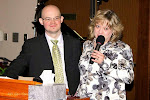Behold now, I have taken upon me to speak unto the Lord, which am but dust and ashes. For He knows our frame; He remembers that we are dust. Thine hands have made me and fashioned me together round about; yet thou dost destroy me? Remember, I beseech Thee, that Thou hast made me as the clay; and wilt thou bring me into dust again? All go unto one place; all are of the dust, and all turn to dust again. Then shall the dust return to the earth as it was: and the spirit shall return unto God Who gave it. Thou hidest Thy face, they are troubled: Thou takest away their breath, they die, and return to their dust. What profit is there in my blood, when I go down to the pit? Shall the dust praise thee? Shall it declare Thy truth? For in death there is no rememberance of Thee: in the grave who shall give Thee thanks? His breath goeth forth, returneth to his earth; in that very day his thought perish. Let every thing that hath breath praise the LORD. Hallelujah!
I know that my Redeemer lives, and that in the end He will stand on the earth And after my skin has been destroyed, yet in my flesh I will see God; I myself will see Him with my own eyes—I, and not another.
But perhaps someone will ask, “How is the resurrection achieved? With what sort of body do the dead arrive?” Now that is talking without using your minds! In your own experience you know that a seed does not germinate without itself “dying”. When you sow a seed you do not sow the “body” that will eventually be produced, but bare grain, of wheat, for example, or one of the other seeds. God gives the seed a “body” according to his laws—a different “body” to each kind of seed. Then again, even in this world, all flesh is not identical. There is a difference in the flesh of human beings, animals, fish and birds. There are bodies which exist in this world, and bodies which exist in heaven. These bodies are not, as it were, in competition; the splendour of an earthly body is quite a different thing from the splendour of a heavenly body. The sun, the moon and the stars all have their own particular splendour, while among the stars themselves there are different kinds of splendour. These are illustrations here of the raising of the dead. The body is “sown” in corruption; it is raised beyond the reach of corruption. It is “sown” in dishonour; it is raised in splendour. It is sown in weakness; it is raised in power. It is sown a natural body; it is raised a spiritual body. As there is a natural body so will there be a spiritual body. It is written, moreover, that: ‘The first man Adam became a living being’. So the last Adam is a life-giving Spirit. But we should notice that the order is “natural” first and then “spiritual”. The first man came out of the earth, a material creature. The second man came from Heaven and was the Lord himself. For the life of this world men are made like the material man; but for the life that is to come they are made like the one from Heaven. So that just as we have been made like the material pattern, so we shall be made like the Heavenly pattern. For I assure you, my brothers, it is utterly impossible for flesh and blood to possess the kingdom of God. The transitory could never possess the everlasting.
Listen, and I will tell you a secret. We shall not all die, but suddenly, in the twinkling of an eye, every one of us will be changed as the trumpet sounds! The trumpet will sound and the dead shall be raised beyond the reach of corruption, and we who are still alive shall suddenly be utterly changed. For this perishable nature of ours must be wrapped in imperishability, these bodies which are mortal must be wrapped in immortality. So when the perishable is lost in the imperishable, the mortal lost in the immortal, this saying will come true: ‘Death is swallowed up in victory’ ‘O death, where is your sting? O Hades, where is your victory?’ It is sin which gives death its power, and it is the Law which gives sin its strength. All thanks to God, then, who gives us the victory over these things through our Lord Jesus Christ! And so brothers of mine, stand firm! Let nothing move you as you busy yourselves in the Lord’s work. Be sure that nothing you do for him is ever lost or ever wasted.
Gen. 18:27; Ps. 103:14; Job 10:8-9; Ecc. 3:20, 12:7; Ps. 104:29, 30:9, 6:5, 146:4, 150:6.
Job 19:25-29
1 Corinthians 15:35-58 Phillips Translation

